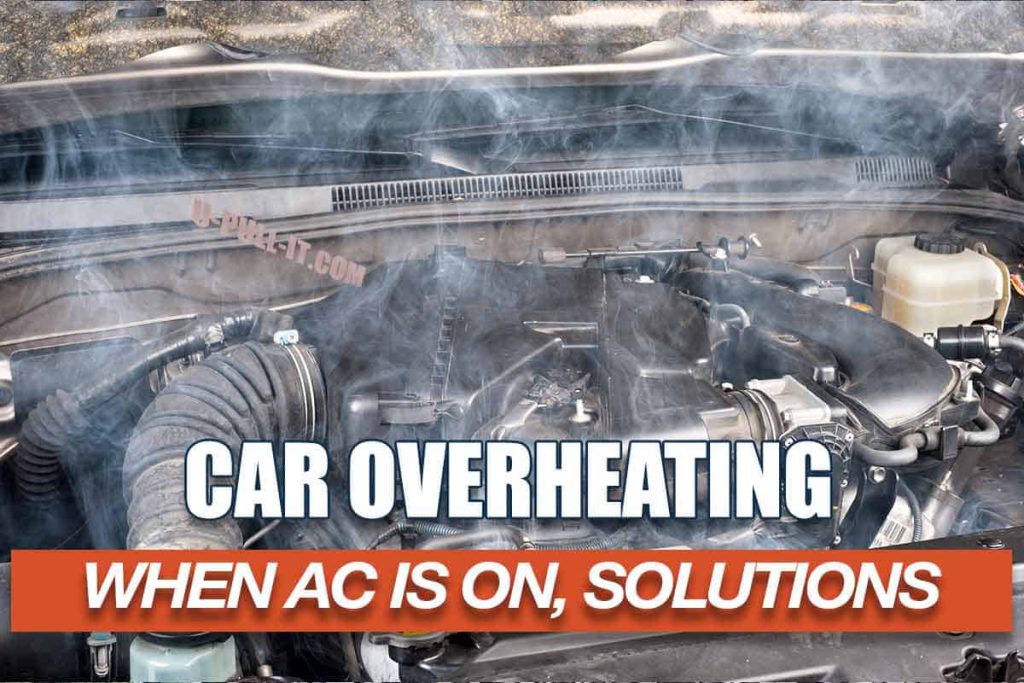Car Overheating with AC On
Is your car feeling the heat when you turn on the AC? You’re not alone. Many cars face this common issue, particularly with the motor and condenser fins, especially during scorching weather. But what’s the big deal about a little overheating? Well, it can wreak havoc on your engine’s performance and coolant mixture.
When your car overheats, it puts extra strain on the engine and vital components like the radiator, temperature sensor, and compressor, potentially causing damage. The culprit behind this ordeal? Your trusty AC unit. While it keeps you cool with its coolant mixture, it also generates extra heat in the engine compartment of cars, pushing the temperature gauge to alarming levels. It does so by working the condenser fins harder, which in turn heats up your vehicle.
To prevent your car from overheating, ensure your engine fan, compressor, ac condenser, and drive belt are functioning properly. Regular maintenance is key to avoiding an overworked engine and a faulty ac condenser that could leave you stranded on a sweltering day.
So next time your engine overheats when you hit that AC button, take notice. If your car’s temperature is rising faster than mercury in summer, it may be a sign of issues with your engine fan or compressor. Take action and check the water level before things get too hot to handle!

Symptoms and Causes of Car Overheating with AC On
Symptoms
- Engine temperature gauge rising above the normal range.
- Low coolant levels leading to inadequate cooling system function.
- Malfunctioning radiator fan causing insufficient airflow.
Car overheating when the AC is on can be a frustrating issue that many drivers encounter, often due to a defective engine coolant or a faulty engine fan. It’s important to understand the symptoms and common signs of these issues, as well as the compressor and water-related underlying causes behind this problem.
One of the most noticeable symptoms of a car overheats situation is when the engine temperature gauge starts to rise above its normal range. This indicates that the engine is getting hotter than it should, possibly due to a faulty compressor or AC condenser or inadequate water, which can lead to potential damage if not addressed promptly.
Another symptom often associated with car overheating when the AC compressor is on is low coolant levels. The cooling system, including the compressor, relies on an adequate amount of coolant to effectively regulate the engine’s temperature. Insufficient coolant levels can result in poor cooling system and compressor function, leading to overheating issues.
A malfunctioning radiator fan or compressor can also contribute to car overheating, especially when driving numerous km with the AC on. The radiator fan and compressor play crucial roles in maintaining proper airflow through the radiator, which helps dissipate heat from the engine. If the fan or compressor fails or operates at a reduced capacity, there won’t be enough airflow to cool down the engine, causing it to overheat.
Possible Solutions to Fix Car Overheating with AC On
Regular maintenance of the compressor in the cooling system is crucial for preventing car overheating when the AC is on, even over long distances like several km. Here are some steps you can take to address this issue.
- Flushing and refilling coolant: Over time, coolant can become contaminated or lose its effectiveness. Regularly flushing and refilling the coolant helps maintain the optimal performance of the cooling system.
- Repairing or replacing faulty radiator fans or thermostat: If your car’s radiator fans are not functioning properly, they may not provide adequate airflow to cool down the engine. Similarly, a malfunctioning thermostat can disrupt the cooling process. It is important to repair or replace these components as needed.
- Ensuring proper airflow through the radiator: Debris or obstructions in front of the radiator can hinder airflow and contribute to overheating. Regularly cleaning any debris and fixing obstructions will help ensure proper cooling.
By following these steps, you can effectively address car overheating issues when using the AC. Remember that regular maintenance and timely repairs are essential for keeping your vehicle’s cooling system in top shape.
Please note that if these solutions do not resolve the car overheats problem, it may be necessary to consult a professional mechanic for further diagnosis and assistance.
Now you have a better understanding of how to tackle car overheating when using the AC. Don’t let this issue ruin your driving experience – take action today!

Reasons for car overheating when AC is idle
- Inadequate air circulation due to a malfunctioning condenser fan
- Insufficient refrigerant levels affecting the efficiency of the AC system at idle
- Clogged condenser preventing heat dissipation
When your car overheats, specifically when the AC is idle, there are several common reasons that could be causing this issue. Understanding these reasons can help you identify and address the problem effectively.
- Inadequate air circulation: A malfunctioning condenser fan can result in inadequate air circulation, leading to overheating. The condenser fan plays a crucial role in dissipating heat from the AC system. If it fails to operate correctly, it restricts airflow, especially when the car is idling.
- Insufficient refrigerant levels: Another reason for overheating could be insufficient refrigerant levels in your AC system. When refrigerant levels are low, the AC system’s efficiency decreases, causing it to work harder to cool down the cabin temperature. This increased workload can lead to excessive heat generation and subsequent overheating.
- Clogged condenser: A clogged condenser can also contribute to car overheating when the AC is idle. Over time, dirt, debris, and other contaminants can accumulate on the condenser fins, obstructing proper heat dissipation. As a result, heat gets trapped within the system, leading to overheating issues.
To address these problems and prevent your car from overheating when the AC is idle:
- Regularly inspect and maintain your condenser fan to ensure it operates smoothly.
- Check and maintain proper refrigerant levels according to manufacturer recommendations.
- Clean or have your condenser professionally cleaned periodically to remove any buildup that may impede heat dissipation.
By addressing these common reasons for car overheating when the AC is idle, you can keep your vehicle running smoothly even with the air conditioning on during periods of idling.
Importance of regular coolant system inspection
Regular inspection of the coolant system is crucial to ensure the smooth operation of your vehicle, especially when the AC is on. By detecting leaks or cracks in hoses, radiators, or water pumps early on, you can prevent potential issues from escalating. A good sign that there is a leak is the odor smell of coolant coming from any of the internal pipes or joints. Here are a few reasons why regular coolant system inspection is important:
- Maintaining appropriate coolant levels: Checking and maintaining proper levels of engine coolant is essential to prevent overheating. Low coolant levels can lead to an increase in engine temperature, especially when the air conditioning system is running.
- Identifying worn-out components: Over time, components in the coolant system, such as hoses, radiators, ac condensers, and water pumps, may wear out or become damaged. Regular inspections help identify these worn-out components before they cause major problems like engine overheating.
- Preventing future issues: A thorough inspection can reveal any signs of a defective engine coolant sensor or a faulty coolant temperature sensor. Detecting these issues early allows for timely repairs or replacements, preventing further damage to the engine.
- Detecting leakages and corrosive substances: Coolant leaks can occur due to various reasons, such as cracked hoses or corroded radiator fins. Regular inspections help identify these leakages and any corrosive substances that may be affecting the efficiency of your cooling system.
By prioritizing regular inspections of your car’s coolant system, you can proactively address potential problems before they escalate into more significant issues like engine overheating when the AC is turned on.
Remember to consult with a qualified mechanic if you notice any abnormalities in your vehicle’s cooling system to ensure optimal performance and avoid costly repairs down the road.
Troubleshooting the Car Air Conditioner
Is your car overheating when the AC is on? Don’t sweat it! Here are some troubleshooting steps to help you get to the root of the problem with your car air conditioner.
Checking for Refrigerant Leaks
- Use UV dye and pressure gauges to detect any refrigerant leaks in the air conditioning system.
- Look for signs of leakage, such as oily residue or stains around fittings and connections.
- If a leak is found, consult a mechanic to fix it promptly.
Verifying AC Compressor Clutch and Electrical Connections
- Ensure that the AC compressor clutch engages properly when the AC is turned on.
- Examine electrical connections for any loose or damaged wires on your compressor.
- Faulty connections can cause an overload on the AC compressor, leading to overheating.
Noting Unusual Sounds or Odors
- Pay attention to any strange sounds or odors coming from your air conditioning system.
- Noisy operation or unusual smells could indicate issues with the condenser, AC compressor, or faulty fan.
- If you notice anything out of the ordinary, seek professional assistance.
Remember, regular maintenance and timely repairs are essential for keeping your car’s AC system running smoothly. By addressing these potential problems early on, you can prevent further damage and enjoy cool rides even during scorching summers. So don’t let an overheating AC ruin your day – take action today!
Now that you know how to troubleshoot common issues with your car air conditioner, you’ll be better equipped to tackle any cooling problems that come your way. Stay cool and drive comfortably!
Check the engine coolant temperature sensor.
The engine coolant temperature sensor plays a crucial role in monitoring and regulating the temperature of your car engine. It is a key component of the vehicle’s cooling design, which is responsible for preventing the engine from overheating.
The can engine sensor works by measuring the temperature of the coolant in the engine and sending this information to the engine control unit (ECU). The ECU then uses this data to adjust the fuel injection, ignition timing, and, most importantly, the operation of the cooling fans. In essence, the engine coolant temperature sensor ensures that the engine operates within its optimal temperature range, enhancing its performance and longevity.
However, a faulty sensor can significantly affect the cooling of your ride. If the sensor is malfunctioning, it may send incorrect temperature readings to the ECU. This can result in the cooling fans not activating when they should, leading to car engine overheating.
On the other hand, if the faulty sensor sends a reading that the engine is hotter than it actually is, the cooling fans may run continuously. This not only wastes energy but can also lead to other issues like premature wear of the fans and a decrease in fuel efficiency.
In some cases, a faulty sensor might not trigger the check car engine light, making it difficult for you to realize there’s a problem until it’s too late. Therefore, it’s essential to regularly check and maintain the engine coolant temperature sensor to ensure a smooth and cool ride.
Can the air pressure on the ac system lead to overheating of the car engine?
High air pressure in your car’s AC system can make your engine overheat. The AC’s compressor, which pumps the cooling refrigerant, can work too hard if there’s too much air pressure. This extra work uses more engine power and can cause overheating, especially in hot weather or on steep hills (ac compressor overload).
If your car overheats when the AC is on, or if your AC isn’t cooling like it used to, you might have high air pressure. A mechanic can check this for you. So, remember to watch your car’s temperature when using the AC in tough conditions. If your AC seems off, get it checked to keep your engine healthy and you cool.
Make sure your car’s AC has enough gas by using an air pressure gauge. Your car probably needs around 28 to 32 ounces of refrigerant, which is about 2 to 3 cans of 12oz each. But remember, bigger cars or those with rear A/C might need more. To know the exact amount, take a look at your vehicle’s manual. It’ll tell you the system capacity for your specific car.

Faulty Control Module or
If your car’s Engine Control Module or Engine Control Unit ECU has a glitch, it could mean big problems for your engine. Mistakes with the timing, the mix of fuel and air, or overheating might harm important components of your engine and the ac compressor over time. Fixing these parts can cost a lot of money.
Conclusion
To prevent your car from overheating when the AC is on, it is crucial to understand the symptoms, causes, and possible solutions. Regular inspection of the cooling system is also essential for maintaining optimal performance. Troubleshooting the car air conditioner can help identify any issues that may contribute to overheating. By following these steps, you can ensure a smooth driving experience even with the AC running.
Remember to pay attention to warning signs such as rising temperature gauges or steam coming from under the hood. These symptoms indicate that your car may be overheating with the AC on. Addressing this issue promptly can prevent further damage to your vehicle’s engine.
To avoid car overheating while idling with the AC on, it is important to understand why this occurs. Factors such as low coolant levels or a malfunctioning radiator fan could be contributing to this problem. Identifying and addressing these issues will help keep your car cool even when stationary.
Regularly inspecting your coolant pressure ensures that it remains in good condition and prevents any potential problems from escalating. This step should not be overlooked as it plays a vital role in maintaining your car’s overall performance.
In conclusion, by understanding the causes and symptoms of car overheating with AC on, implementing appropriate solutions, and conducting regular inspections of your coolant apparatus, you can keep your vehicle running smoothly and avoid any unwanted breakdowns.
FAQs
Can I continue driving if my car starts overheating with the AC on?
It is not recommended to continue driving if your car begins to overheat with the AC on. Pull over safely and allow your engine to cool down before proceeding.
How often should I inspect my coolant system?
It is advisable to have your coolant system inspected at least once every six months or according to your vehicle manufacturer’s recommendations.
Are there any specific signs that indicate an issue with my car’s air conditioner?
Yes, signs such as weak airflow, strange odors, or unusual noises coming from the AC unit can indicate a problem that needs attention.
Can I use any type of coolant for my car?
No, it is important to use the coolant recommended by your vehicle manufacturer. Using the wrong coolant can lead to performance issues and potential damage.
What should I do if my car overheats while idling with the AC on?
If your car starts overheating while idling with the AC on, turn off the AC immediately and allow your engine to cool down. Check for any visible cooling system issues and consult a professional if needed.
How long does it take for a car to cool down after overheating?
The cooling time can vary depending on several factors such as ambient temperature and severity of overheating. It is best to wait until all warning signs have subsided before resuming driving.
Is it possible to prevent car overheating completely when using the AC?
While it may not be possible to completely eliminate the risk of car overheating with the AC on, regular maintenance and prompt attention to warning signs can significantly reduce this occurrence.




